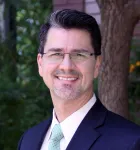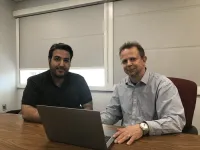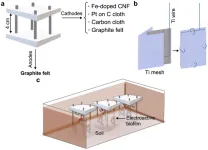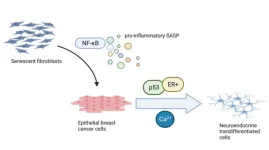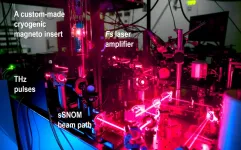(Press-News.org) Key takeaways
Researchers studied the way different generations in Romania determined the truth of information following the country’s transition from authoritarianism to democracy.
Those who were born and raised after the transition were more likely than older cohorts to compare and evaluate different perspectives before deciding who is right.
The factors associated with the youngest generation’s style of thinking were greater exposure to formal education and social media.
While people change and learn throughout life, experts recognize that certain formative periods, known as developmental windows, are crucial for acquiring particular skills. For example, using vocalizations and words to interact with people in the first few years of life is critical for children’s language learning.
A recent study by an international team from UCLA, Romania and Israel suggests there may be a developmental window for reasoning skills as well — the first 25 years of life — and that a person’s social, political and economic environment strongly influences how they acquire these skills. Their findings are published in the journal PLOS One.
The researchers found that following the collapse of Romania’s authoritarian communist regime in 1989, the rapid increase in education and technology use and the transition from a single, government-controlled source of information to diverse sources had a strong effect on the way people, particularly younger generations, thought about and determined truthfulness, a process known as “epistemic thinking.”
Epistemic thinking runs the gamut from absolutist thinking, the belief that only one claim can be right, to multiplist thinking, the belief that more than one claim could be right — it’s just a matter of opinion. Finally, evaluativist thinking posits that assertions can be evaluated in terms of both logic and evidence.
“Whether we are monitoring various news sources or scrolling through a busy Twitter feed, we are constantly encountering diverse viewpoints about topics ranging from politics to films,” said the study’s first author, Amalia Ionescu, a doctoral student in psychology at UCLA. “Some of these topics carry infinitely more weight than others, but ultimately, we are using the same sort of mechanism when deciding how to make sense of contrasting viewpoints.”
In the U.S., developmental psychology research has shown that children typically think in absolutist terms, then progress to multiplist thinking and sometimes, particularly with a relatively high level of education and exposure to various experiences and points of view, emerge as evaluativist adults. The study authors hypothesized that in a society ruled by an authoritarian government, with strict control over information, limited education and little exposure to the outside world, absolutist thinking would be more prevalent. Conversely, in an open, democratic society, there would likely be a higher occurrence of evaluativist thinking.
To test this, they focused on Romania, which in the late 1940s became communist and aligned itself with the Soviet Union. Beginning in 1965, under the authoritarian leadership of Nicolae Ceaușescu, Romania became increasingly repressive and isolated. After Ceaușescu was overthrown in 1989, the country quickly moved toward democracy, embraced a market economy and joined the European Union. Today, Romanians have a developing education system and open access to technology, social media, consumer goods and travel.
How, the researchers asked, may this transition have affected Romanians’ epistemic thinking? Focusing on three age cohorts — those born after the democratic revolution (18–30 years old), those who spent their late adolescence and early adulthood under the authoritarian regime (45–59) and those who spent at least 45 years under the authoritarian regime (75 and older) — the authors presented respondents with scenarios in which two characters had contrasting views. They then asked the respondents: Which character is right? Or are both of them right? Why?
They found that there was a greater occurrence of absolutist thinking among those who had experienced the transition to democracy in middle age rather than at an earlier period of life.
The vast majority of those 75 or older tended to read or listen to the news and instantly take it as truth, “possibly because for most of their lives, they had only one TV program to watch, and all books, news, movies and music were under communist censorship,” said co-author Raluca Furdui, a master’s student at Romania’s West University of Timișoara. “They learned to respect the authority of the teachers in schools, and some never even had the chance to go to high school.
“In contrast,” Furdui said, “we, the youngest generation in our study — currently between 18 and 30 — were challenged by our teachers to express our opinions, think critically and check information.”
The researchers found that evaluativism was most common among this youngest generation, which also had the highest education levels. Lower levels of both formal education and social media use predicted higher levels of absolutist thinking and lower levels of evaluativism.
The study authors concluded that the developmental window for epistemic thinking is open during the first 25 years of life, after which it slowly closes, and a person’s epistemic thinking style will change little later in adulthood.
“We found that the social environment produced by a combination of democracy and a market economy more frequently led people to abandon the assumption that there is one right answer and to evaluate multiple possibilities — when one was born into this environment or when it was experienced in the first 25 years of life” rather than in middle age or beyond, said co-author Patricia Greenfield, a UCLA distinguished professor of psychology. “We found that there is indeed a sensitive developmental period for acquiring cultural ways of thinking.”
The ‘open information’ pendulum can swing the opposite way too
The authors also said they believe their findings can help explain why unfettered access to information, social media and a plethora of personal opinions can sometimes lead in the opposite direction — toward absolutist thinking and authoritarian politics.
“Along with the rise of the internet and social media, there has been, in the United States, a rise in the importance of personal opinion, along with a decline in the importance of agreed-upon facts,” Greenfield said.
And while the trend toward increasing sources of information and opinions in Romania has been associated with the democratization and opening up of society, in the U.S., the indiscriminate application of the principle that everyone has a right to their own opinion has led to information silos and absolutist thinking.
“In Romania, the transition from authoritarianism to democracy was related to a decline in absolute thinking and a rise in evaluation as a form of thought,” said co-author Michael Weinstock, an associate professor of education at Israel’s Ben Gurion University of the Negev. “But based on our research, one would predict that that the opposite change in the environment — towards more authoritarianism — would lead to the opposite direction of change towards more absolutist thinking.”
Changes in the authoritarian direction happened in the U.S. under the Trump administration, the study authors said, and have recently been happening in other countries around the world.
END
Is it too late to change your mind? Study reveals ‘developmental window’ for thinking styles
Social environment through early adulthood plays a big role in how people learn to evaluate information and make decisions about what is true
2023-05-12
ELSE PRESS RELEASES FROM THIS DATE:
TVT 2023 late-breaking science announced
2023-05-12
NEW YORK – May 12, 2023 – The Cardiovascular Research Foundation (CRF) announced that TVT: The Structural Heart Summit will feature 15 Late-Breaking Clinical Science studies. An annual meeting featuring cutting-edge research and techniques for structural heart interventions, TVT will take place June 7-10, 2023, at the Phoenix Convention Center – West in Phoenix, Arizona.
TVT has become the epicenter of innovation and collaboration in the structural heart arena over its 16-year history. The meeting brings together world-renowned experts and master operators to help translate novel discoveries into practical therapies for patients with valvular heart disease.
TVT’s ...
UArizona Engineering alum returns to lead School of Mining and Mineral Resources
2023-05-12
Misael Cabrera has been selected through a nationwide search as the inaugural director of the School of Mining and Mineral Resources. The school was created in 2021 and is jointly housed in the College of Engineering and the College of Science, with strong partnerships to additional colleges and centers.
“Our role is to deliver talent and technology through research, but also to change the top-of-mind association with mining. We can create real solutions that both industry and our planet need,” said Cabrera.
Cabrera, who began the position in April, most ...
Researchers track antimicrobial resistance in E. coli isolated from swine
2023-05-12
The spread of drug-resistant microbes has become a global health concern that threatens our ability to treat infections. The widespread use of antimicrobials in livestock, such as swine farms, exacerbates this problem. Therefore, we need surveillance systems to monitor these microbes to support the public health authorities. To this end, researchers have tracked the antimicrobial resistance of Escherichia coli isolated from swine.
Antimicrobials are essential for preventing and treating infections in humans and animals. According to the US Food and Drug Administration, 70% of all antibiotic ...
Carbon-based cathodes impact biofilm composition and performance in soil microbial fuel cells
2023-05-12
In the context of increasing energy demands and environmental concerns, renewable energy solutions are crucial for achieving net-zero emissions by 2050. Microbial electrochemical technologies, such as SMFCs, are cost-effective and environmentally friendly, making them an attractive option for green energy systems. SMFCs utilize endogenous microorganisms present in soil to convert organic matter into electricity, offering a sustainable energy source and a self-powered in situ bioremediation strategy for contaminated soils.
Cathode materials play a significant role in the performance of microbial fuel cells. In this study, researchers compared the performance ...
Healthy teeth thanks to the "washing machine effect”
2023-05-12
Ruminants like cows have developed an unusual way of digesting their food: they ingest plants, give them a rough chewing and then swallow the half-chewed mash before regurgitating it repeatedly and continuing to chew. This has clear advantages, as a research team including the University of Göttingen has shown: the regurgitated mushy food contains much less hard grit, sand and dust than the food that they first ingested. This protects the teeth from being ground down during the chewing process. This ...
The senescence-associated secretory phenotype induces neuroendocrine transdifferentiation
2023-05-12
“We recently unveiled a new interesting role for SASP: its ability to induce neuroendocrine transdifferentiation (NED) in breast cancer epithelial cells [3].”
BUFFALO, NY- May 12, 2023 – A new editorial paper was published in Aging (listed by MEDLINE/PubMed as "Aging (Albany NY)" and "Aging-US" by Web of Science) Volume 15, Issue 8, entitled, “The senescence-associated secretory phenotype induces neuroendocrine transdifferentiation.”
In this editorial, researchers Anda Huna, Nadine Martin and David Bernard from the Université de Lyon discuss the senescence-associated secretory phenotype (SASP). SASP, ...
Steckel selected as a Southern Weed Science Society Fellow
2023-05-12
Larry Steckel, row crop weed specialist and professor in the Department of Plant Sciences at the University of Tennessee Institute of Agriculture, has been named a Fellow of the Southern Weed Science Society (SWSS).
The award was given to honor Steckel’s years of research and contributions to weed prevention in row crop agriculture. Steckel was among only a small group of esteemed researchers to receive the honor, presented to him during the annual meeting of the SWSS.
Steckel says he is proud to be named a Fellow, and that he knows the research and extension work conducted by weed specialists across the ...
Manufacturing and metrology considerations are key when designing with freeform optics
2023-05-12
Manufacturing and metrology considerations are key when designing with freeform optics
Close communication between optics designers and manufacturers can help prevent problems
Québec City, Canada -- Although optical components such as lenses are traditionally spherical in shape, freeform optical components, which have little to no symmetry around the optical axis, are becoming more common. Freeform optical components are attractive because they can be designed to behave in ways traditional optics cannot, offering optical design flexibility ...
Ultralow temperature terahertz microscope capabilities enable better quantum technology
2023-05-12
A team of scientists from the Department of Energy’s Ames National Laboratory have developed a way to collect terahertz imaging data on materials under extreme magnetic and cryogenic conditions. They accomplished their work with a new scanning probe microscope. This microscope was recently developed at Ames Lab. The team used the ultralow temperature terahertz microscope to take measurements on superconductors and topological semimetals. These materials were were exposed to high magnetic fields and temperatures below liquid helium (below 4.2 ...
New study puts a definitive age on Saturn’s rings—they’re really young
2023-05-12
A new study led by physicist Sascha Kempf at the University of Colorado Boulder has delivered the strongest evidence yet that Saturn’s rings are remarkably young—potentially answering a question that has boggled scientists for well over a century.
The research, to be published May 12 in the journal Science Advances, pegs the age of Saturn’s rings at no more than 400 million years old. That makes the rings much younger than Saturn itself, which is about 4.5 billion years old.
“In ...
LAST 30 PRESS RELEASES:
Alkali cation effects in electrochemical carbon dioxide reduction
Test platforms for charging wireless cars now fit on a bench
$3 million NIH grant funds national study of Medicare Advantage’s benefit expansion into social supports
Amplified Sciences achieves CAP accreditation for cutting-edge diagnostic lab
Fred Hutch announces 12 recipients of the annual Harold M. Weintraub Graduate Student Award
Native forest litter helps rebuild soil life in post-mining landscapes
Mountain soils in arid regions may emit more greenhouse gas as climate shifts, new study finds
Pairing biochar with other soil amendments could unlock stronger gains in soil health
Why do we get a skip in our step when we’re happy? Thank dopamine
UC Irvine scientists uncover cellular mechanism behind muscle repair
Platform to map living brain noninvasively takes next big step
Stress-testing the Cascadia Subduction Zone reveals variability that could impact how earthquakes spread
We may be underestimating the true carbon cost of northern wildfires
Blood test predicts which bladder cancer patients may safely skip surgery
Kennesaw State's Vijay Anand honored as National Academy of Inventors Senior Member
Recovery from whaling reveals the role of age in Humpback reproduction
Can the canny tick help prevent disease like MS and cancer?
Newcomer children show lower rates of emergency department use for non‑urgent conditions, study finds
Cognitive and neuropsychiatric function in former American football players
From trash to climate tech: rubber gloves find new life as carbon capturers materials
A step towards needed treatments for hantaviruses in new molecular map
Boys are more motivated, while girls are more compassionate?
Study identifies opposing roles for IL6 and IL6R in long-term mortality
AI accurately spots medical disorder from privacy-conscious hand images
Transient Pauli blocking for broadband ultrafast optical switching
Political polarization can spur CO2 emissions, stymie climate action
Researchers develop new strategy for improving inverted perovskite solar cells
Yes! The role of YAP and CTGF as potential therapeutic targets for preventing severe liver disease
Pancreatic cancer may begin hiding from the immune system earlier than we thought
Robotic wing inspired by nature delivers leap in underwater stability
[Press-News.org] Is it too late to change your mind? Study reveals ‘developmental window’ for thinking stylesSocial environment through early adulthood plays a big role in how people learn to evaluate information and make decisions about what is true
